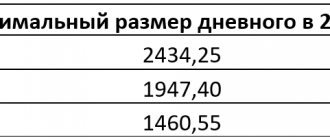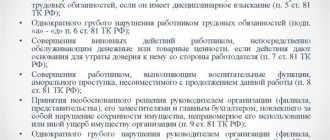Home / Criminal
Back
Published: December 27, 2019
0
18
- 1 Components of remuneration
- 2 Word of the legislator
- 3 Documentation that sets out the payment procedure
- 4 Allowances and surcharges: the difference between concepts
- 5 What is a personal allowance and when is it established?
- 6 Bonuses paid regardless of the will of the employer
- 7 Deprivation of bonus
The essence of a personal allowance
An employee can receive not only a “bare” salary, but also additional payments, including those assigned in addition to wages.
The Labor Code does not have a precise definition of a bonus. The bonus included in the salary, reflected in the employment contract or additional agreement to it, is common to all personnel when certain conditions occur, for example, for work in certain climatic zones, for shift work, etc. Such bonuses are not considered personal.
If the employer is not obliged to assign a bonus, but he does it for individual employees on an individual basis, reflecting the conditions of the appointment in a special Regulation, collective agreement or other local act, such payment will be a personal bonus . The right to assign such payments by the employer is granted by Art. 135 Labor Code of the Russian Federation.
Allowances and surcharges: the difference between concepts
In order to motivate employees, employers can pay not only the wages required by law, but also funds in the form of bonuses or other material incentives. And the state, in turn, obliges managers to pay additional payments when certain cases occur.
Now let's look at these points in more detail. What is a surcharge?
As for the general features, there is one: both payments increase the employee’s remuneration.
And their differences are as follows:
- Additional payments are mandatory, allowances are not;
- An additional payment is compensation, and an allowance is an incentive payment;
- The bonus emphasizes the importance of the employee, and the additional payment is designed to compensate for difficult working conditions.
The feasibility of assigning personal allowances
In what cases may an employer need a personal allowance mechanism? When might it be necessary to make remuneration special for a specific employee or group of employees? The following options are possible:
- the employer wants to highlight the successes of a particular employee;
- there is a desire to reward an employee for having outstanding or unique knowledge and skills;
- It is undesirable to change the existing system of rates and salaries, but at the same time there is a need for additional incentives for workers.
Question: When calculating vacation pay, should I take into account the bonus paid to the employee by March 8, the personal bonus to the salary and the one-time charge for mentoring? View answer
How does the salary increase work?
A salary supplement is an additional payment for professional activities, calculated on the basis of:
- established tariff rates;
- official salaries;
- piece rates.
Attention! Information about the employee’s bonus must be reflected in the employment contract as conditions for payment for work activities.
Salary supplements are of two types:
Mandatory bonuses are additional payments established for the performance of certain job duties. For example, additional payment for a shift work schedule or work in an area with a special climate.
If an employer wishes to establish a bonus for an employee in the absence of conditions for establishing a mandatory additional payment, then such a bonus will be considered personal and is established on an individual basis.
A personal allowance can be established for employers for:
- employee's work experience;
- professional excellence;
- working with trade secrets;
- knowledge of a foreign language;
- academic degree;
- work results.
The bonus can be set as a fixed amount (for example, 1000 rubles to the salary) or as a percentage (for example, 15% of the salary).
In any case, the amount of any additional payment must be reflected in the employment contract. In some cases, it is permissible to refer to a document defining the procedure for calculating a personal bonus to an employee’s salary.
Different types of personal allowances
The type of allowance can be determined by various factors:
- Basis for accrual - the employer has the right to assign a personal allowance:
- for experience;
- for skill level;
- for a certain intensity of work;
- for professional excellence;
- for performing tasks of special importance and/or urgency;
- for “bonus” skills and abilities, for example, knowledge of a foreign language;
- for an academic degree in a specialized field;
- for work under conditions of official secrecy, etc.
- Duration of validity of the provisions on the allowance - these payments can be established either permanently or temporarily:
- for a month;
- per quarter;
- for a year;
- indefinitely.
- The amount of the premium can be determined in different ways:
- a fixed amount is fixed in local documents;
- the amount of the bonus is calculated in a certain way, for example, as a percentage of the salary or average salary;
- determination of the size by the labor participation rate: the monthly amount allocated for allowances will be distributed differently within the group of workers.
NOTE! Despite the fact that the amount for personal allowances is not limited by law, they should not be set in an amount exceeding the monthly salary. Large premiums are difficult to justify in court in the event of any disputes; there is a high probability that they will be recognized as part of mandatory payments. Practice shows that the maximum amount of a personal bonus should not be more than 50% of the salary, and the optimal amount is 10-20%.
Coefficients for calculating official salaries
According to labor legislation, an official salary is a fixed amount of payment for labor activities for the performance of one’s own official duties. The official salary cannot include social, incentive or compensation payments.
The Labor Code of the Russian Federation defines the basic salary as the wage rate of an employee of a state or municipal organization carrying out the professional activities of a worker or employee without taking into account additional payments.
Thus, the minimum wage established at the state level serves as the basis for establishing the official salaries of employees.
The salary of any employee directly depends on many factors, including:
- work load;
- specialized education;
- qualification;
- work experience.
Attention! The official salary is a fixed amount of remuneration, established depending on the position held by the employee, qualifications, specialized education and length of service at the given enterprise.
The amount of remuneration for the work activities of employees is established based on salary schemes , which are developed at the level of an organization or an entire industry:
- Industry schemes are used to determine the salaries of employees of organizations financed from budgetary sources.
- Salary schemes approved at the level of firms financed from their own funds take the form of a staffing table indicating the range of specialist positions and the corresponding salary amounts.
The salary schedules for both groups may indicate a salary range, called a salary range.
Establishing minimum and maximum wages makes it possible to determine employee salaries individually, based on their qualifications, work experience, volume of work performed and business qualities.
The level of professionalism of both specialists and workers is determined by gradation into categories, due to which employee salaries are differentiated. Most organizations are characterized by a three-stage gradation.
Who gets a personal allowance and who doesn’t?
Additional personal benefits can be assigned to any full-time employee of the organization, since they are added to his salary, often calculated as a percentage of his salary. At the same time, the registration of an employee on the staff does not have much significance; the following may qualify for a personal allowance:
- an employee who has entered into a regular employment contract;
- "conscript";
- part-time worker.
It is not customary to assign personal bonus payments to the following categories of workers:
- freelancers;
- workers working under a contract;
- who have concluded civil contracts.
Registration of a personal allowance
IMPORTANT! A sample order for establishing a personal allowance from ConsultantPlus is available here
The employer is not obliged to include the terms of the personal bonus in the employment contract, since this is an incentive payment. But since this is still part of the remuneration, it must be documented.
To do this, you need to regulate the personal bonus in a collective agreement or in the Regulations on remuneration and be sure to refer to this document in the text of the employment agreement (Article 57 of the Labor Code of the Russian Federation).
IMPORTANT! If the employer does not include provisions on the bonus in local documents, paying it without registration, he is not threatened with legislative liability. The only thing that can serve as a disadvantage for the employer in such a situation is that unreasonable payments cannot be attributed to expenses that reduce the tax base.
Petition and order for personal allowance
How else can you arrange the payment of a personal allowance, if not through a separate document? This may be necessary when the nature of the payments is not systematic, but one-time or calculated for a certain period. In this case, it is advisable to draw up a memo (petition) from immediate management to a higher one who has the authority to assign a bonus. This could be the general director, financial director, head of the personnel department, chief accountant, etc. In the text of the note, in addition to the mandatory details of business documents, you should indicate:
- arguments justifying the assignment of a bonus to a specific employee or their group;
- the expected amount of additional payment;
- at what expense is the premium supposed to be assigned (for example, from the wage fund or by increasing profits from sales, etc.);
- validity period of additional payments.
ATTENTION! It is not customary to formalize permanent allowances using memos. After the expiration of the specified period, you can again apply for a supplement. With this kind of document you can request the appointment, increase, decrease, extension or cancellation of a personal payment.
The compiled memo, signed by management, will become the basis for preparing an order for the calculation of the allowance. The execution of this order can be in any form. It is important to correctly motivate the appointment of additional payments, since their feasibility from a production or economic point of view is a guarantee that these costs are included in the cost of production, which is very strictly checked by tax authorities.
After issuing an order to assign an allowance, the employee must be familiar with it, which is confirmed by a personal visa (this procedure is common for any orders).
Bonuses paid regardless of the will of the employer
As Article 149 of the Labor Code says, the employer is obliged to pay for:
- For working conditions that are harmful, dangerous or difficult;
- For work in harsh climate conditions (if an employee spends the entire working day on the street, he has the right to receive this payment);
- For work at night (if the schedule is not shift);
- If the employee performs work that requires a high level of knowledge and skills;
- If an employee combines several positions at once.
The above list is the main one; there may be additional items, but they are already determined by the employment contract. But there is a nuance that needs to be paid attention to while the employment contract has not yet been signed, then it will be very difficult to appeal: the employer can indicate in the employment contract a list of works that the employee is obliged to perform. In this situation, the employee cannot demand additional payment.
- Each employee must have a task, for the successful solution of which he receives encouragement. But the task must first of all be solvable, and not a dead end. Simply put, any employee should have the opportunity to achieve good results;
- If we are talking about a bonus, then the amount should arouse interest, that is, be significant. It is unlikely that an employee will refuse smoking breaks for a bonus of 200 rubles;
- Employees should be aware that it is possible to receive certain incentives and additional payments. It is best to notify about this by drawing up an annex to the employment contract. Each newly arrived employee will be immediately familiar with this.
We invite you to familiarize yourself with: Conclusion of contracts for the provision of utility services
If the manager is ready to encourage his employees and pay them extra for something, then these recommendations will be quite feasible.
Let us add that, according to Part 2 of Art.
57 of the Labor Code of the Russian Federation, the condition for the payment of allowances (as well as additional payments and bonuses) is a mandatory condition of the employment contract (in cases where the organization’s staffing schedule or local regulations provide for these components of wages). The condition can be either direct (the name and amount of the bonus is indicated directly in the employment contract) or referential (the employment contract states that the employee can be given bonuses in accordance with local regulations and the employer’s staffing table).
According to Part 1 of Art.
Note!
At the same time, additional payments, allowances and incentive payments due to an employee may be directly indicated in the employment contract, or it may make reference to the relevant local regulation or collective agreement, which provides the grounds and conditions for their payment. In the latter case, Rostrud indicated, the employee must be familiar with the content of local regulations and the collective agreement against signature.
Extract from the letter of Rostrud dated December 24, 2007 No. 5275-61
Remuneration systems, including tariff rates, salaries (official salaries), additional payments, compensatory allowances, including for work in conditions deviating from normal, systems of additional payments and incentive allowances and bonus systems, are established by collective agreements, agreements, local regulatory acts in accordance with labor legislation and other regulatory legal acts containing labor law norms.
The basic concepts and definitions used in organizing the remuneration of workers are enshrined in Article 129 of the Code. Based on these definitions, the tariff rate, as well as the salary (official salary) have a fixed amount of remuneration. Article 57 of the Code includes among the conditions mandatory for inclusion in an employment contract the terms of remuneration (including the size of the tariff rate and salary (official salary) of the employee, additional payments, allowances and incentive payments).
All of the above allows us to say that when stipulating the terms of remuneration of an employee in an employment contract, the amount of payment (tariff rate or salary) should be indicated in numerical terms [1]. As for additional payments, allowances and incentive payments due to an employee, they can be are directly indicated in the employment contract or it may make a reference to the relevant local regulatory act or collective agreement that provides the grounds and conditions for their payment. In the latter case, the employee must be familiarized with the content of local regulations and the collective agreement against signature.
CONCLUSION FIRST. Incentive payments must be specified in the employment contract with the employee.
In this case, their fixed amount may be indicated (in ruble terms or in other units of measurement) or a reference may be made to a local regulatory act (or collective agreement) that provides the grounds and conditions for their payment.
If the fixed amount of the bonus is specified in the employment contract, and the employer considers it necessary to reduce its size, it is necessary to notify the employee at least two months in advance, against signature, about the change in the terms of the employment contract (Parts 1, 2, Article 74 of the Labor Code of the Russian Federation) and draw up an additional agreement to employment contract with the employee.
Extract from the Labor Code of the Russian Federation
Article 74.
Changing the terms of an employment contract determined by the parties for reasons related to changes in organizational or technological working conditions In the case when, for reasons related to changes in organizational or technological working conditions (changes in equipment and production technology, structural reorganization of production, other reasons), the conditions determined by the parties employment contracts cannot be preserved; they can be changed at the initiative of the employer, with the exception of changes in the employee’s labor function.
If the fixed amount of the bonus is specified in a local regulatory act, then before reducing its size, it is necessary to make changes to this local act and, two months before the changes enter into force, familiarize the employee with them against signature.
CONCLUSION TWO.
It is extremely unprofitable for an employer to establish a fixed amount of incentive payments in employment contracts and local regulations without specifying the conditions for their payment, since in this case the employer is obliged to pay all specified amounts monthly under any circumstances, and the need for any changes will require compliance with the procedure prescribed by Art. 74 Labor Code of the Russian Federation.
ARBITRAGE PRACTICE
2009 No. 12202 came to the conclusion that, given that the parties at the conclusion of the contract determined the size of the bonus in the form of a fixed amount, its payment is not made dependent on any conditions, it is mandatory, the presence in the company of other systems of additional payments and incentive allowances the nature and bonus systems do not indicate a violation of legal requirements when concluding an agreement with the plaintiff.
Approximate wording of the conditions for payment of an incentive bonus in a local regulatory act is given in the example.
Example
Approximate wording of the conditions for payment of incentive bonuses in the local regulatory act of the employer
[…]
7.1. The employee is given a salary of 20,000 rubles. per month.
– full completion of the monthly working hours. If the monthly working time limit is not fully worked out, the bonus is paid in proportion to the time worked;
– timely, conscientious and high-quality performance of work duties;
[…]
– a single violation of internal labor regulations without applying disciplinary action to the employee;
[…]
– a single violation of internal labor regulations, which resulted in the application of a disciplinary sanction to the employee, or repeated violations of internal labor regulations within a month;
– failure to perform or improper performance of duties provided for in the job description;
– violations of safety regulations and labor protection requirements;
– failure to comply with orders and instructions from management;
[…]
ARBITRAGE PRACTICE
Leningrad Regional Court in the Determination dated 14.10.
2010 No. 33-5015/2010 noted that information about the employee’s familiarization with the Regulations on remuneration and bonuses by the employer was not provided, in addition, with the newly introduced Regulations, the employer actually unilaterally changed the terms of payment for the employee, since no written agreement was signed between the parties.
On the form and content of the staffing table. The staffing table is used to formalize the structure, staffing and staffing levels of an organization in accordance with its Charter (Regulations).
2004 No. 1 “On approval of unified forms of primary accounting documentation for the accounting of labor and its payment”, then, according to the Instructions for the use and completion of forms of primary accounting documentation for the accounting of labor and its payment, given in the said Resolution, in columns 6–8 “Additions » shows incentive and compensation payments (bonuses, allowances, additional payments, incentive payments) established by the current legislation of the Russian Federation (for example, northern bonuses, bonuses for an academic degree, etc.), as well as those introduced at the discretion of the organization (for example, related to the regime or working conditions).
Important nuances of personal increases
It is important to regulate all financial issues correctly and take into account all legislative subtleties. When assigning personal increases, the employer must take into account certain circumstances:
- A correctly executed personal allowance in accounting is treated as “labor expenses”.
- The bonus is calculated simultaneously with the salary.
- This payment is included in the calculation of average earnings necessary for calculating, for example, vacation pay (Resolution of the Government of the Russian Federation No. 922 of December 24, 2007, as amended on October 15, 2014).
- If the deadline specified in the bonus regulations is violated, when the payment is unreasonably and unexpectedly terminated earlier for the employee, the employee has the right to demand additional accrual of the bonus and payment of late fees.
- If the head of a structural unit does not send a memo on time, personal payments will be stopped, because this document is the basis for issuing an order to accrue funds.
- If an employee receiving a personal allowance is transferred to another position, the right to the allowance is not retained unless it is provided for by the provisions of the new position.
- A change in the leadership of an organization may lead to changes in the provisions on personal allowances.
- A personal allowance must be reflected in the staffing table, indicating the numbers of orders for its accrual.









